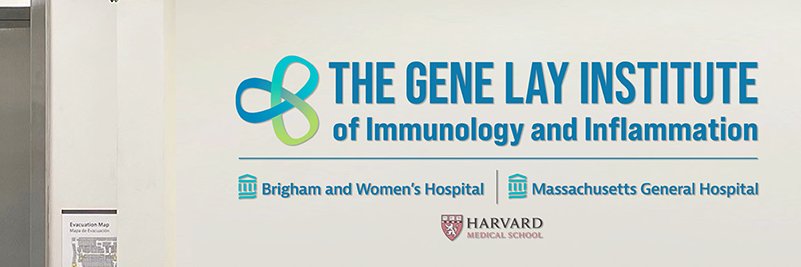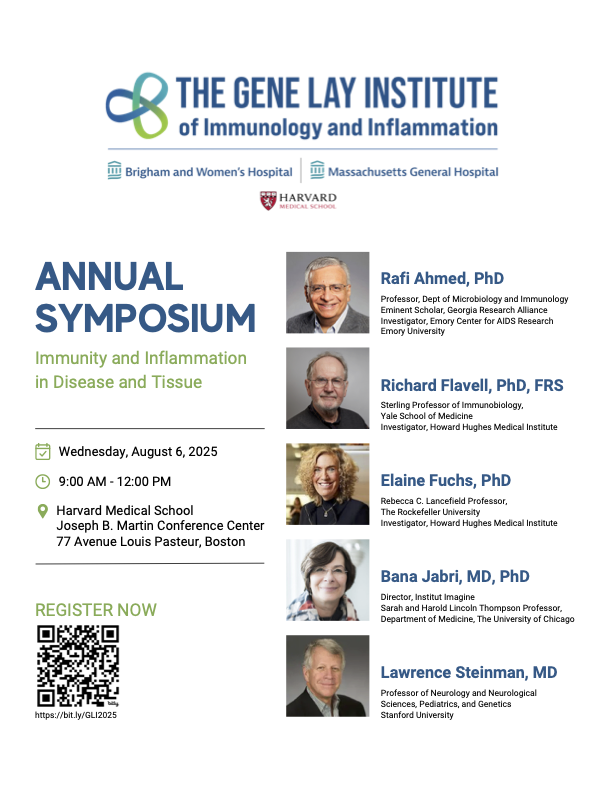
Gene Lay Institute of Immunology & Inflammation
@GeneLayInst
Immunology-focused research in cancer & aging | Understanding immune evasion & resilience to improve health outcomes @BrighamWomens @MassGeneralNews @HarvardMed
The Gene Lay Institute of Immunology and Inflammation was founded on a generous gift @BrighamWomens @MassGeneralNews & @harvardmed. give.brighamandwomens.org/gene-lay-insti…

In our latest collab w/the Clardy Lab @HarvardMed to mine microbial metabolites for immunomodulators, we identified how Eggerthella lent—one of the most studied & least understood members of the human gut microbiome—upregulates inflammatory responses in a cell- & antigen- (cont.)
Check out our recent work with John Rioux and the iGenoMed Consortium! Serum proteomic and metabolomic profiling in #IBD patients initiating vedolizumab identified pro-inflammatory analytes associated with treatment response. onlinelibrary.wiley.com/doi/10.1111/im…
Our annual symposium on Immunity & Inflammation in Disease & Tissue is on again – August 6th at the Joseph B. Martin Conference Center, Boston MA. Looking forward to talks from @RafiAhmed_Lab, Richard @FlavellLab, @ElaineFuchsLab, #BanaJabri & @LarrySteinman.

Our newest paper studying immunosuppressive astrocyte-GBM interactions using RABID-seq is out in @Nature today! Congrats to Brian Andersen and @CamiloFaustAkl! nature.com/articles/s4158…
Very excited to share our latest work in @NatureGenet w/ @cssmillie’s lab: a spatial transcriptomics atlas of stricturing #Crohns disease that offers new insights into mechanisms driving fibrotic complications in chronic gut inflammation...(cont.) nature.com/articles/s4158…
Have you registered yet for #ReThinkNeuroimmunology in October? Organizers, @QuintanaLabHMS @Stevens1Lab @JonyKipnis @IdoAmitLab @RejaneRua have put together stellar program for the 3-day event. #RTN Register here:🔗genelayinstitute.org/rtn/
New pre-print from our lab here: biorxiv.org/content/10.110…
Happy to share that this study led by @TheNeuroImmLab Allon Wagner & Johannes Fessler, in collaboration with @YosefLab, is now published @CellReports. We uncover that the glycolytic enzyme, PGAM, suppresses Th17 pathogenicity & autoimmunity cell.com/cell-reports/f…
Not all glycolytic enzymes promote Th17 cell pathogenicity. Our study shows that phosphoglycerate mutase (PGAM) is a key metabolic regulator suppressing Th17 cell pathogenicity in vivo. Read more in our preprint 👇with @TheNeuroImmLab @YosefLab biorxiv.org/content/10.110…
NPR story on 1st AD pt. Rx w/nasal foralumab shorturl.at/ba16d Moderate AD- not eligible for lecanemab. Expanded access Rx. Tolerating it well. To begin controlled trial at BWH in mild AD. Lost my mom to AD who asked “Howie, can you help me?” I couldn’t then, but could now.
What a huge effort from grad student @RockyBarilla who was responsible for driving this project. Well done to Rocky & everyone involved.
🚨New paper with @TheXavierLab @ScienceMagazine on the critical role of 🔁neuroimmune crosstalk in immune defense in the gut! @GeneLayInst @MGBResearchNews @HarvardMed @BroadInstitute science.org/doi/10.1126/sc…
Bacterial sphingolipids delivered by outer membrane vesicles persist within mammalian immune cells and promote IL-10 secretion via the mevalonate pathway cell.com/cell-host-micr… @TheXavierLab @cellhostmicrobe @ericmichbrown
(1/6) Exciting! Our latest paper in @cellhostmicrobe shows that sphingolipids in Bacteroides outer membrane vesicles (OMVs) induce a tolerogenic host cell response through the cholesterol biosynthesis pathway. cell.com/cell-host-micr…
Out now in @Science! We and the @KuchrooLab described responses of enteric neurons to inflammatory cues during infection, showing that primary sensory neurons detect type 2 cytokines, balance neuropeptides, and influence site-specific immunity. science.org/doi/10.1126/sc…
Drs. Oleg Butovsky and Neta Rosenzweig published the article, “Alzheimer’s disease and age-related macular degeneration: Shared and distinct immune mechanisms.” @ImmunityCP cell.com/immunity/abstr…
📢 Check out this new @Nature study! .@QuintanaLabHMS and collaborators establish that IL-11–STAT3-driven #astrocytes suppress #glioblastoma-specific protective immunity by inducing TRAIL-dependent T cell apoptosis. 👉 go.nature.com/3F3NyNt
Type 2 cytokines act on enteric sensory neurons to regulate neuropeptide-driven host defense science.org/doi/10.1126/sc… @ScienceMagazine @RockyBarilla @KuchrooLab @TheXavierLab
We show that Th2 cytokines act on enteric sensory neurons to regulate neuropeptide-driven clearance of gut pathogens🪱🪱. Well done @RockyBarilla @Linyu_Sun_ @kitsiyer @GizemAltun97 @YuHou27680053 & the rest of the team
🚨New paper with @TheXavierLab @ScienceMagazine on the critical role of 🔁neuroimmune crosstalk in immune defense in the gut! @GeneLayInst @MGBResearchNews @HarvardMed @BroadInstitute science.org/doi/10.1126/sc…
Kudos to Francisco and the @QuintanaLabHMS on this beautiful work. Glioblastoma-instructed astrocytes suppress tumor-specific T cell immunity.
Our study on glioblastoma-associated immunoregulatory astrocytes is out in @Nature today by @CamiloFaustAkl! We identified GBM-derived IL-11 as a regulator of TRAIL+ astrocytes, which limit anti-tumor T cell responses via apoptosis. nature.com/articles/s4158…
Our study on glioblastoma-associated immunoregulatory astrocytes is out in @Nature today by @CamiloFaustAkl! We identified GBM-derived IL-11 as a regulator of TRAIL+ astrocytes, which limit anti-tumor T cell responses via apoptosis. nature.com/articles/s4158…